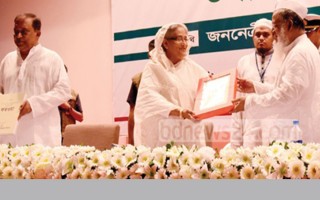QOUMI COURSE RECOGNITION Govt puts cart before horse: academics
Academics have observed that the government has put the cart before the horse recognising Dawra-e-Hadith degree of Qawmi madrassahs as equivalent to master’s degree while the Qawmi madrassah education is not recognised and syllabus of the course is backdated.
Talking to New Age, they said that the decision made by prime minister Sheikh Hasina was entirely political to appease a vested quarter and it hardly had any academic benefit rather would cause more complexities in job sector and society.
‘The government has put the cart before the horse and it would call in more complexities in the job sector and society,’ said Dhaka University professor emeritus Serajul Islam Choudhury.
‘The decision was entirely political and has hardly have connection with academic matter,’ he said, adding, ‘the decision was taken to keep a vested quarter satisfied.’
Dhaka University Islamic studies department chairman Shafiqur Rahman said, ‘Qaumi madrassahs have been following the same syllabus for Dawra-e- Hadith degree since the colonial period. They have not included new knowledge in the syllabus.’
Dhaka university history professor Muntassir Mamoon and Bangladesh University of Engineering and Technology computer science and engineering professor M Kaykobad said that the government should have evaluated the credit and syllabus of the dawra before recognising it.
Hasina on April 11 announced the recognition of certificates of Dawra-e-Hadith under Qaumi Madrassah Education Board as equivalent to master’s degree in Islamic Studies and Arabic at a meeting with leaders of Qawmi madrassahs at Ganabhaban in the capital.
The recognition was given based on the basic principles of Darul Ulum Deobandh of India and maintaining separate characteristics of the qawmi madrassahs, she said.
The education ministry on April 13, issued a circular recognising Dawra-e-Hadith degree and formed a nine-member committee headed by Hefazat-e-Islam chief Shah Ahmed Shafi, also the chairman of Befaqul Madarisil Arabia Bangladesh, to ensure the quality of the certificate.
The committee would be the highest decision making body on matter relating to the dawra certificate and the examinations would be held under its supervision.
Shafiqur Rahman said that students got enrolled on master’s in Islamic studies and Arabic course completing graduation studying English, Bangla, information technology and courses on Islamic economics, Islamic banking, Islamic social system and Islamic political history and others which were revised time to time.
Dawra-e-Hadith course is focused on the Quran and hadith only and the students hardly have to study English, Bangla, Islamic economy, political history and others, he added.
‘The decision to recognise the degree without improving the syllabus and curriculum is unexpected and nobody knows the contents of their textbooks,’ Serajul Islam said.
He added that this degree would undermine the other master’s degree courses. ‘The degree [Dawra] would not help Qoumi people that much in the job market,’ he added.
The government gave the recognition while the entire qoumi madrassah education system was unrecognised and unregistered and it would create more problem, said Muntassir Mamoon, adding that the government would be compelled to give recognition to other unregistered degrees when they might mount pressure.
Kaykobad proposed that before making any rules and others formalities, the government should evaluate the syllabus and curriculum of the dawra degree. ‘We cannot say that that a diploma engineer is equivalent to an engineer.’
University Grants Commission chairman Abdul Mannan declined to comment before the framing of the rules and other formalities for making Dawra-e- Hadith degree equivalent to master’s degree.
Directorate of Madrasah Education director general Billal Hossain said that no qoumi madrassah was registered with the directorate.
There are two madrassah education systems – Alia and Qoumi. Alia is registered and offers religious education with some modern subjects and Qoumi runs with no government monitoring, supervision or support. Qoumi madrassahs run on private donations mostly.
According to the Bangladesh Bureau of Educational Information and Statistics, there are 14 lakh students at about 14,000 qoumi madrassahs in the country.
- See more at: http://www.newagebd.net/article/13540/govt-puts-cart-before-horse-academics#sthash.fzIKS1Hc.dpuf











